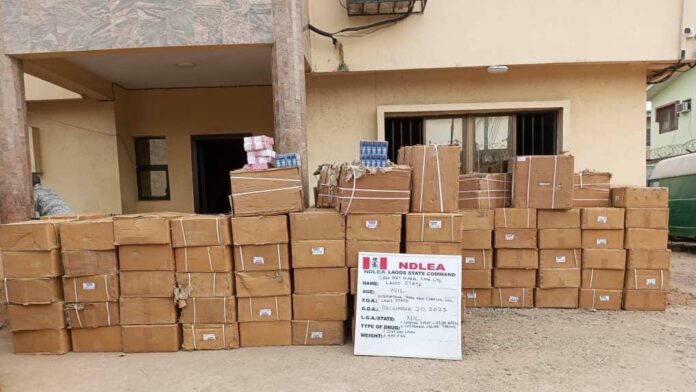THE Senate, on Thursday, May 9, approved a bill to amend the National Drug Law Enforcement Agency (NDLEA) Act to include a death penalty for people involved in drug-related crimes in Nigeria.
The Senate approved the death sentence as the maximum punishment for drug-related offences as part of amendments to the NDLEA Act.
It approved the death penalty as punishment for the importation of hard drugs into the country.
The punishment will also be meted out to persons involved in the production, transportation, sale, and distribution of hard drugs through any channel in Nigeria.
Among the substances listed in a new bill approved by the Senate are heroin and cocaine.
The bill is titled, “National Drug Law Enforcement Agency (NDLEA) Act (Amendment) Bill, 2024.”
Currently, the maximum punishment for drug offenders is life imprisonment.
Senate Chief Whip Ali Ndume suggested that the sentence be ‘toughened’ to the death penalty during the debate of the report on the bill.
The penalty for drug importation or dealership is captured in Section 11 of the existing law, which Ndume sought to increase to a death sentence.
“This should be changed to the death sentence. This is the standard worldwide. We have to do this to address this drug problem that has seriously affected our youth.
“It should be toughened beyond life imprisonment. It should be the death sentence, either by hanging or any other way,” Ndume told his colleagues.
However, a few senators, including Adams Oshiomhole, a former governor of Edo State, publicly objected to the Senate’s decision.
Raising his voice, an irritated Oshiomhole informed his colleagues that he rarely made jokes about matters about life and death.
“This is lawmaking. We are not here to take voice votes,” Oshiomhole stated.
However, the Deputy Senate President (DSP), Barau Jibrin, informed Oshiomole of Senate procedure, stating that he should have requested a division of the Senate as soon as the vote was completed and before the Senate proceeded to another section of the bill which contained the change.
Another senator from Akwa Ibom State, Sampson Ekong, also attempted to challenge the decision, but he was denied.
The bill was approved for a third reading by the Senate.
The bill’s report was jointly developed by the Committees on Human Rights, Legal Matters/Drugs and Narcotics, and the Judiciary.
It is a misplaced priority – stakeholders
Meanwhile, some concerned Nigerians have described the bill as a misplaced priority.
In his submission on the issue, the Director General of the Centre For Credible Leadership And Citizens Awareness, Gabriel Nwambu, said the major problem facing Nigeria is corruption.
Nwambu, an anti-corruption crusader, said it was a misplaced priority to put a death sentence on those found culpable in drug dealing and exempt people found guilty of corruption.
According to him, those found to be corrupt should be punished with the same punishment to deter intending and future perpetrators.
Nwambu said a death sentence for those involved in drug dealing and drug racket might not have the desired effect Nigeria needed.
He described the country’s present situation as an ” all-time low” and urged that all efforts be channelled towards fighting corruption.
“It has never been this bad. The country goes cap in hand on the streets of China, looking for where to take loans, and these loans are not even utilised and would also be embezzled.
“The truth is clear and very evident: the problem we have in Nigeria is a result of the failure of leadership, and corruption is a major challenge we have now,” Nwambu stated.
He advised the anti-corruption agencies to focus on past governors who looted their state’s treasury.
“I suggest that the death penalty should be on corrupt individuals, corrupt persons found guilty under a court, before a court of competent jurisdiction.
“It is more appropriate if you do that. That is enough punitive measures to sanitise this country. Nobody will want to be corrupt,” he added.
Also speaking with The ICIR in a chat, a school proprietor, Layiwola Lawrence, accused the legislators of always trying to avoid laws that directly affect them.
“They can’t approve laws that they will be guilty of in the future. They are always biased, and this can’t help the development of our country,” he stated.
The ICIR reported that the NDLEA seized 29,789 drugs between January and February this year.
Cannabis accounts for the most significant number of seizures, with 26,876, while 68 kilogrammes of cocaine were confiscated.
The anti-drug trafficking agency also arrested 2,744 drug traffickers within the period.
Among those arrested, 805 cases were charged to court, 684 persons, including 636 males and 48 females, were convicted, and 316 persons were rehabilitated.
These figures were contained in data covering January and February 2024, which the agency, through its spokesperson, Femi Babafemi, sent to The ICIR on Tuesday, April 2.
A reporter with the ICIR
A Journalist with a niche for quality and a promoter of good governance




















